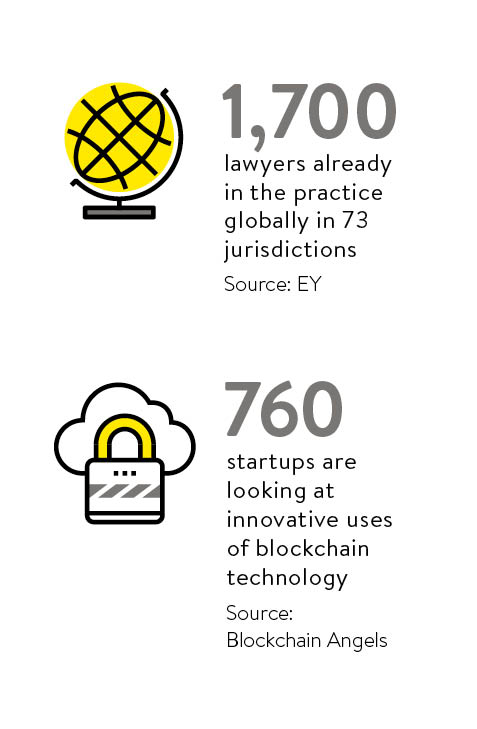In the 18 months since EY was granted an ABS (alternative business structure) licence by the Solicitors Regulation Authority, its legal practice in the UK has grown rapidly. As a new practice, it is looking to be at the forefront of the technology revolution and to continue building on the strengths of the wider EY business.
Already the team has grown to more than 50 people in the UK and has made some key lateral hires from the City and US firms.
“We have done what we set out to do, which is to build a really strong platform from which we can now grow. We have recruited a great team of people already, many of whom are leading industry names within their area,” says Phil Goodstone, head of law in the UK. “Over the next five years we want to build a sizeable UK business focused on some very specific areas of the market.”
EY plans to add significant scale to the UK business by 2020, although EY emphasises that the numbers and time frame are of secondary importance.
“We have a very clear strategy. We have focused on building a multi-disciplinary practice, integrating law with the wider services EY offers, and on some key sectors and markets. Our absolute commitment is to find and develop the right people, and to embrace new and emerging technologies as we grow our business,” says Mr Goodstone.

One of the sectors upon which EY has focused is financial services. As Matthew Kellett, head of law for financial services, explains: “Everything starts with building a client-centred, distinctive and differentiated offering.”
The business, says Mr Kellett, seeks to “build on the deep sector understanding and relationships that the firm has, layering legal on to it, to create an integrated, multi-disciplinary practice.”
So how is EY’s offering different and distinctive? As Mr Kellett explains: “We are multi-disciplinary in the widest sense in that what we offer is a team of lawyers working on a truly integrated basis with other sector-focused professionals at EY, be they accountants, consultants or programmers.
“The firm already has an outstanding reputation in financial services. The ambition of my team is to further enhance that reputation by building the leading financial regulatory practice, offering both traditional risk and compliance, together with a more ‘holistic’ legal risk offering.”
Mr Kellett has made a number of significant hires to accelerate the growth of the financial services practice, including Matt Whalley from BLP, Steven Francis from Baker & McKenzie and James Gee from Weil Gotshal & Manges.
As well as financial services, EY has also launched its legal technology practice, appointing Richard Goold, formerly co-chairman of tech at Gowling WLG, to lead the team. EY will also shortly launch a mergers and acquisitions legal team focused on the North West and UK more widely, following the appointment of Paul Devitt and Richard Thomas in Manchester.
Where the business focuses next, says Mr Goodstone, will depend on getting the right talent to lead in other areas where EY is strong and looking to build.
“We started by building out some core capabilities in areas such as corporate, employment and commercial law. But we’ve been clear from the outset that we aren’t looking to build a separate law firm within EY,” says Mr Goodstone. “Our focus has always been to have law work side by side with other areas of the business. It’s about developing legal services that complement EY’s existing services and sector teams, so clients ultimately have a single point of contact for all their professional services.”
He is also clear that technology will be at the heart of the development of the business. “There is a huge focus across the whole of EY on the opportunities that existing and emerging technologies present for our clients, and how we deliver services to our clients. The sense of energy from the team to ensure law is at the heart of this has been incredible.”
Mr Kellett adds: “EY has a great reputation for using tech solutions. There’s a wealth of knowledge within the business that we already tap into, and we are determined to develop further our culture of innovation in the team and embrace new technology.”
The ambition is to achieve continual, sustainable growth by a relentless focus on clients and people – and at the heart of this will be technology and innovation
So what impact are technologies having on the development of the practice? “While in many ways we are still only at the beginning of this, we are already seeing how technology can enhance both our offerings to our clients and also to our people in terms of how and where they work, whether it is the ability to offer truly flexible working to all of our teams, document automation to speed up delivery to clients, electronic document review software or contract management systems,” says Mr Goodstone.
“But this is only scratching the surface. What really excites us is to work out how we develop our services for the benefit of clients and our teams by embracing new technologies”.
With the legal services market going through a period of change, EY clearly aims to be a positive part of that change. Globally the practice already has more than 1,700 lawyers in 73 jurisdictions and emerging technologies will only enhance the abilities of the firm to offer a truly global service.
As for what lies ahead for EY’s UK legal team, Mr Goodstone concludes: “The ambition is to achieve continual, sustainable growth by a relentless focus on clients and people – and at the heart of this will be technology and innovation.”
Philip Goodstone and Matthew Kellett can be contacted via e-mail at PGoodstone@uk.ey.com and MKellett@uk.ey.com or for further information please visit ey.com

